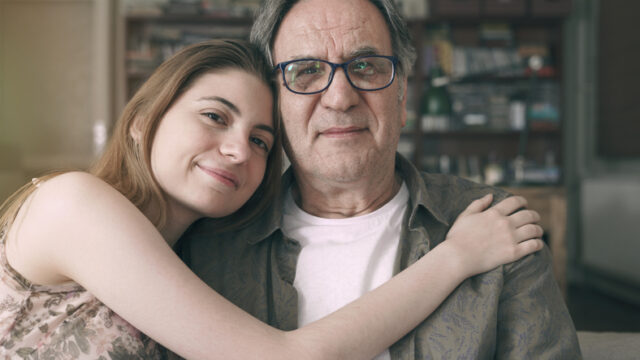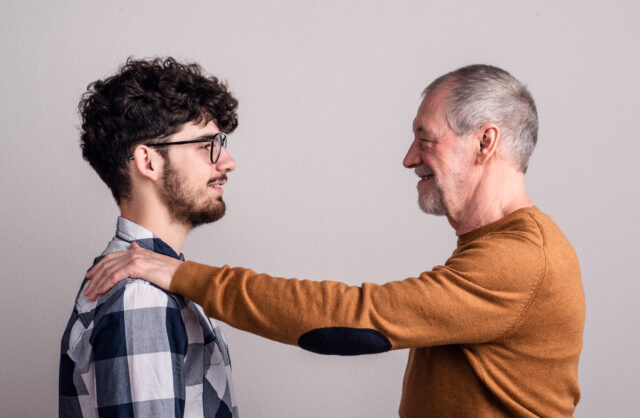If you grew up playing the unofficial role of family peacemaker, it probably taught you a lot about reading the room, calming tensions, and putting everyone else’s needs first.

The problem is that those so-called “skills: didn’t just disappear once you grew up. Instead, they’ve likely seeped into your adult relationships too, sometimes in ways you don’t even recognise because they’re just so natural to you. If you were always the one who quelled tensions and sorted out everyone’s issues, chances are, you have these habits with the people in your life now, whether that’s colleagues, friends, or romantic partners.
1. You feel responsible for keeping everyone calm.

When you’re used to smoothing over family arguments, it becomes second nature to try and manage the emotional temperature of every room you walk into. Even now, you might instinctively jump in to prevent fights, ease awkwardness, or calm someone down before things escalate. While it can make you a comforting presence to other people, it’s also exhausting. It’s easy to forget that it’s not actually your job to fix everyone else’s emotions all the time.
2. You struggle to express your own anger.

If you grew up in an environment where your role was to defuse tension, showing your own anger probably felt dangerous or selfish. So even when you’re hurt or frustrated now, your first instinct might be to swallow it rather than risk making waves. As time goes on, this can lead to resentment building under the surface because no matter how good you are at smoothing things over, your own feelings still deserve to be heard too.
3. You constantly scan for signs of conflict.

Family mediators are experts at reading tiny shifts in tone, body language, and energy because growing up, catching those early warning signs often meant the difference between peace and chaos. Even now, you might find yourself hyper-aware of tension in social settings, picking up on little things other people miss. It’s a useful skill, but it also means you rarely get to fully relax around people.
4. You tend to downplay your own needs.

When you’re focused on managing everyone else’s emotions, your own needs can start to feel like less of a priority, or even like a burden. You learned early on that things went more smoothly if you kept yourself small and easygoing. As an adult, you might still struggle to advocate for what you want, not because you don’t know, but because it feels uncomfortable to take up that kind of space when you’re so used to shrinking yourself for the sake of harmony.
5. You’re incredibly good at seeing multiple sides of a story.

Being the mediator taught you not to just hear one version of events. You learned how to understand everyone’s perspective, find middle ground, and keep things from blowing up bigger than they needed to be. In adult relationships, this makes you empathetic and fair, but it can also leave you stuck in situations where you excuse bad behaviour because you’re so good at seeing the “why” behind it.
6. You feel uncomfortable when people are openly emotional.

If you grew up in a home where strong emotions led to fights you had to clean up, even healthy displays of anger, sadness, or frustration might still make you instinctively tense up. You’re not cold or distant; you’re just wired to associate big feelings with danger. It can take conscious effort to remind yourself that not every emotional moment needs rescuing or smoothing over.
7. You take on emotional labour without even realising it.

Supporting, soothing, managing, reassuring—you do it all without thinking. It feels natural because it was expected of you long before you even understood what emotional labour was. In friendships and romantic relationships, this can lead to deep imbalances, where you’re doing the heavy emotional lifting for both people without getting the same level of care in return.
8. You’re uncomfortable asking for help.

As the mediator, you were often the strong one, the person everyone leaned on. So asking for help yourself can feel wrong, weak, or even a little bit scary, like you’re flipping the script you were taught to follow. It’s a lonely way to live, and it’s hard to unlearn. But leaning on other people doesn’t make you a burden; it makes you human, something you deserve to believe deep down too.
9. You instinctively avoid rocking the boat.

Growing up, keeping things stable, even at your own expense, probably felt like a survival skill. So now, whether it’s with friends, partners, or coworkers, you might shy away from raising issues or asking for change because you fear the fallout it might cause. Of course, real connection isn’t about walking on eggshells. Sometimes rocking the boat is exactly what needs to happen for things to get better, even if your old instincts beg you to play it safe.
10. You measure your worth by how useful you are.

If your childhood value came from fixing problems and smoothing conflict, it’s easy to carry that belief into adulthood. You might feel most secure when you’re needed—when you’re helping, organising, supporting, keeping the peace. However, your worth isn’t in how much you give. You deserve relationships where you’re loved just for being yourself, not for how well you patch up other people’s messes.
11. You sometimes mistake calm for connection.

Growing up, calmness often meant success. It meant you’d done your job as the mediator. As a result, you might now associate peace with closeness, even when real emotional intimacy isn’t actually there. It can be confusing to realise that keeping things surface-level and conflict-free isn’t the same as feeling deeply understood and connected to someone on a meaningful level.
12. You carry guilt that isn’t yours to carry.

When things went wrong in your family, part of you probably felt responsible, even if none of it was actually your fault. That old guilt—that sense that you somehow failed to keep everyone together—can linger into adult relationships in ways that are hard to spot. You might blame yourself when relationships struggle, even when the problems have nothing to do with you. Recognising that not everything is yours to fix is a huge, healing step forward.
13. You have an incredible capacity for compassion (but you forget to offer it to yourself).

Growing up as the family mediator stretched your empathy muscles in ways most people can’t imagine. You’re likely one of those people who can sit with someone’s pain without flinching, offering real comfort without judgement. But the flip side is that you might find it harder to turn that compassion inward. You’re so used to being strong for everyone else that giving yourself the same grace, patience, and kindness can feel almost unnatural, but you deserve it just as much as anyone else.




